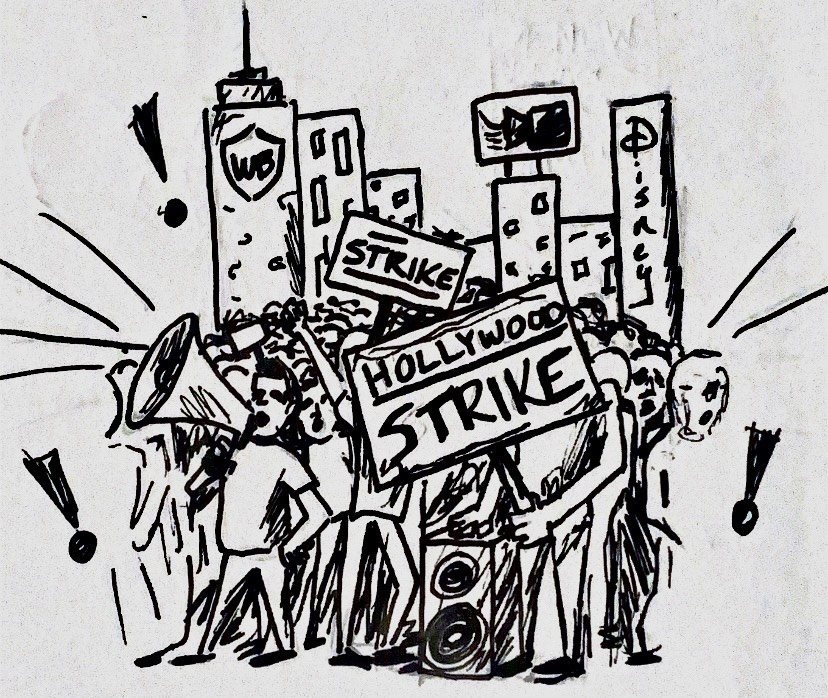On May 2, the Writers Guild of America (WGA) went on strike in response to conflicts over labor and pay with the Alliance of Motion Picture and Television Producers (AMPTP). On July 14, the Screen Actors Guild — American Federation of Television and Radio Artists (SAG-AFTRA) followed suit over similar disagreements with the AMPTP.
The WGA represents 11,500 screenwriters, while SAG-AFTRA represents approximately 160,000 members. These large organizations are on strike with the AMPTP for two primary reasons: to secure better pay compensation and to ensure safety against the use of generative artificial intelligence (AI).
While Hollywood’s shimmer and shine is regularly associated with wealth, many of those on strike have spoken out about the low pay they have received for working on big-name productions. Residuals are payments that actors and writers receive for projects after they get initial compensation for their work, and oftentimes, these residual checks are less than $1.00.
In July 2022, streaming officially surpassed cable and broadcast television’s viewership. Streaming services only get money through subscriptions, making it a somewhat unsustainable business model. Streaming services lose money if subscriber counts are not increasing dramatically every month. With cable, this was not a problem, as advertisements made a great source of revenue for studios.
The New Yorker recently described the experience of Kimiko Glenn, one of the lead actresses in Netflix’s “Orange is the New Black.” She posted a TikTok in December 2020 that showed one of her royalty checks from Netflix. It was for $27.30. In the face of the WGA strike in May of this year, she reposted the TikTok to her Instagram, and castmates commented on her post detailing similar frustrating experiences.
Glenn is far from the first or last to publicize her qualms with pay. Mandy Moore, lead actress in NBC’s “This Is Us,” shared that she often receives checks of less than $1.00 for the streaming residuals for “This Is Us.” Moore’s case is a little different than Glenn’s because “This Is Us” aired live on NBC before going to Hulu for streaming, so she received more pay upfront. That being said, residuals are far from a reliable source of income, especially for those on shows that don’t see a cable timeslot.
Many writers and actors have come forward and said that their pay has decreased since streaming services have become ever-present, making the unions feel higher pay compensation is an urgent need.
The strikes have drawn lots of attention to the use of AI in the entertainment industry. Jack Bushnell, junior neuroscience major, is the president of TU Film Club and said that the use of AI in the film industry is questionable.
“In some perspectives, AI can be used in a good way, but not the way a lot of these companies are planning to or have started to use AI,” Bushnell said. “It’s a little bit concerning, to say the least.”
AI can write scripts and scan background actors for reuse in other projects. This power could greatly limit not only jobs for writers and actors but also the production of creative content.
Beyza Yildirim, sophomore political science major and film studies minor, said these strikes are something that had been on the verge of happening.
“The streaming services like HBO [Max] or Hulu or Netflix, they need to work with the unions just so they can make sure that people are getting their fair wages and residuals,” Yildirim said.
Albert Salinas, operations manager for the department of communication and the staff advisor for TigerTV, said that the strikes are important for the industry, and he is interested to see how things play out.
“I think it’s important for anybody to stand up for what they’re worth,” Salinas said.
Salinas also said that these strikes are an interesting reflection of the commercial and capitalistic society that is America.
“I think the solution is going to have to start coming from the top in that they have to be willing to make sacrifices,” Salinas said. “Letting things go that maybe they don’t necessarily need in their life to adequately compensate the people that are doing the work, … the ones that actually deserve their pay.”









